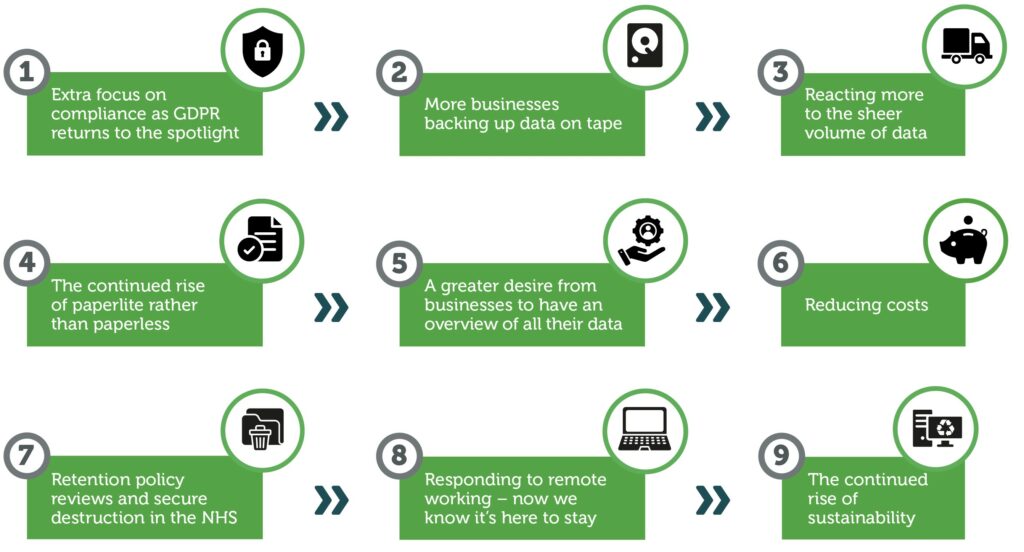From the rise of Paperlite instead of Paperless, to data protection getting new teeth – as well as an ongoing need to reduce costs, of course – 2024 has a lot in store for records management.

We have our finger on the pulse here and see a range of trends emerging. So, here are Restore Records Management’s predictions for the industry in 2024:

Data protection regulation is going to be under the spotlight in 2024 and that could push the topic back into the boardrooms of UK businesses.
The European Data Protection Board (EDPB) will be reviewing data protection regulation during the first quarter of 2024, focusing on how entities are implementing the ‘right of access’. That’s not an easy issue for businesses which don’t have a full vision of what data they are storing or where it is held.
We often hear that Subject Access Requests are time-consuming, costly and complex for many businesses with a physical inventory. So, finding a way to make the process easier will be a trend – especially as the volume of requests is increasing.
The focus will be on improving and speeding up access to inventories, ensuring all documents are properly catalogued and having a process in place. These are the kinds of strategic targets which often lead organisations to outsource their inventory to hit deadlines.
In addition, UK data protection reforms following Brexit are expected to move forward in 2024 as the government seeks to complete its Data Protection and Digital Information Bill, designed to mimic, but also tweak European law.
The EU’s General Data Protection Regulation (GDPR), which first came into force in 2018, has dramatically changed how the handling of personal data is regulated.
We have seen fines increase recently, too. Facebook’s parent company Meta was fined 1.2bn Euros after it mishandled personal data when transferring it between Europe and the United States in 2023. Loss of reputation following a data breach is, perhaps, an even bigger fear for many companies.

As cybercrime continues to rise, especially ransomware, expect businesses to consider a return to physical backups.
One cyber report in December 2023 suggested that ransomware attacks were up 95% compared to the previous year.
The Cyber Crime Security Breaches Survey of 2023 also reported that 32% of businesses suffered a cyberattack during the previous year. The figure was much higher, 69%, for large businesses and for medium sized businesses, 59%.
A good way to mitigate the impact of such attacks is to regularly backup key data on physical tape and add it to your physical inventory.
In fact, all physical documents are less vulnerable to cybercrime because they are not accessible online, and so make a good backup option.
This is something to consider when deciding whether or not to destroy documents which have recently been digitised.
Another way to reduce risk is to ensure only people who need to access documents, whether physical or digital, are given permission to do so. We see the need for such permissions growing as more and more people work from home for at least some part of the week – and still require access to documents when they are away from the office.

The amount of data being generated is a big issue for businesses – creating concerns around storage, access and security.
More than 120 zettabytes of data are predicted to have been created in 2023. That’s approximately 328.77 million terabytes every single day.
This is partly driven by a desire from businesses to make more data-driven decisions. To achieve that, you need to create more data in the first place – and you need that data to be accurate and compliant.
We live in a different and more questioning world, and data is increasingly seen as the definitive answer to a problem or an argument.
Businesses which can ‘prove’ or back up their statements and decisions through data feel stronger for it.
How does that relate to the world of physical documents?
Well, not all data is digital. Many businesses seeking 10 years of data to analyse trends will need to incorporate physical data into the mix.
In fact, even businesses wanting to analyse recent data may find a need to look further back than normal. The pandemic period is not seen as representative of a ‘normal’ financial year, meaning many businesses are searching pre-2020 – including through physical documents.
Expect to see a rise in digitisation of the most requested records and, again, an increased focus on compliance for this reason, too.

Businesses are finding that it is far more cost efficient, and effective, to move away from a dream to digitise all physical data – and to seek a solution which sees paper and digital work alongside each other.
That’s especially important when we have been living through a cost-of-living crisis in the UK.
So, going ‘paperlite’ rather than ‘paperless’ is a trend we see growing in 2024 as economic growth remains slow and interest rates remain high.
The big benefit? Well, it’s an awful lot cheaper than digitising every single record in your inventory, and the reality is you don’t need to do that.
By only digitising records which are required or requested most often, businesses can save money but still achieve their strategic goals. Especially as modern technology means that documents left in physical storage can now be scanned on demand, viewed on an internet portal, or delivered quickly.

Even businesses which outsource their records management retain records on-site in some form or another.
So, they may have physical records safely and compliantly stored with Restore Information Management, all tagged, indexed and given a retention policy.
But they also have multiple documents at their own site – stored in filing cabinets, in desk drawers and on servers – which are not as well managed.
Having oversight of all documents is going to become even more important if you want to be fully compliant and make the most of your data.
We already see a trend of businesses taking greater interest in their overall dataflow, and requiring systems that provide end-to-end solutions for data and documents across all sites.

Rising inflation hit businesses hard in 2023 and the impact is still being felt going into 2024 with rates proving stubborn to reduce.
Expect to see businesses search for ways to make savings and reduce costs.
Moving records management storage offsite can achieve exactly that, and we are already seeing more businesses take that route. Those that have already moved records offsite and requested the digitisation of their most-requested records, to save money on transportation costs.
The additional benefit of this tactic is that it also brings environmental benefits through fewer journeys made.

The NHS has been unable to securely destroy data in recent years because of inquiries taking place following the pandemic. As those inquiries end, we expect to see a new conversation about destruction.
Some Trusts may have a backlog of documents that need to be destroyed and want to start straight away. Others may want to review their retention policy – taking into consideration that inquiries in future may also place different demands on the availability of key documents.
Digital strategies are an increasing focus in the NHS, with data compliance high on the agenda.
ICB teams are now taking an increasing lead on data compliance and focusing on what records they have, to ensure they are being stored and managed in a regulatory-compliant manner.
Expect to see increased activity around the digitisation and destruction of records, including scan on demand.

A lot of businesses have delayed decisions around what to do with their data as they waited to see if people would come back to work.
Now we are pretty sure that remote working is here to stay. The balance may change and flex over time, but it’s hard to see a time when everybody works 9am-5pm in the office every day again.
Adapting to a hybrid working model means many businesses will need to make final decisions on how they store data.
They know that homeworkers need access to documents, but they don’t need access to ALL documents.
Again, we see a ‘paperlite’ vision playing a big part in the solution to this problem.

all sizes. It’s about doing the right thing for the planet, and that’s something we can all buy into.
What’s important is that sustainability is considered in everything a business does – and that includes how you look after your inventory. So, choosing a records management partner that shares your environmental goals is important.
At Restore Information Management we are holders of the of The Planet Mark™ for Business Sustainability Certification. This is a programme that recognises continuous improvement in sustainability.
We are increasing our utilisation of EVs, installing more LED lighting and have set a goal to be carbon neutral by 2030. We also help our customers meet their sustainability goals – for instance by putting systems in place to help reduce the number of delivery journeys. By working together we can all make a difference – and that’s a trend that is certain to grow.

2024 promises to bring significant changes in the field of records management.
If you are looking to stay ahead of the curve and keep up to date with the latest records management trends, you need a partner like Restore Information Management.
To find out how we can assist you in 2024, please contact us!




